Almost all the revelations about what’s taught on university courses in alternative medicine have come from post-1992 universities. (For readers not in the UK, post-1992 universities are the many new univerities created in 1992, from former polytechnics etc, and Russell group universities are the "top 20" research-intensive universities)
It is true that all the undergraduate courses are in post-1992 universities, but the advance of quackademia is by no means limited to them. The teaching at St Bartholomew’s Hospital Medical School, one of the oldest, was pretty disgraceful for example, though after protests from their own students, and from me, it is now better, I believe.

Quackery creeps into all universities to varying extents. The good ones (like Southampton) don’t run "BSc" degrees, but it still infiltrates through two main sources,
The first is via their HR departments, which are run by people who tend to be (I quote) "credulous and moronic" when it comes to science.
The other main source is in teaching to medical students. The General Medical Council says that medical students must know something about alterantive medicine and that’s quite right, A lot of their patients will use it. The problem is that the guidance is shockingly vague .
“They must be aware that many patients are interested in and choose to use a range of alternative and complementary therapies. Graduates must be aware of the existence and range of such therapies, why some patients use them, and how these might affect other types of treatment that patients are receiving.” (from Tomorrow’s Doctors, GMC)
In many medical schools, the information that medical students get is quite accurate. At UCL and at King’s (London) I have done some of the familiarisation myself. In other good medical schools, the students get some shocking stuff. St Bartholomew’s Hospital medical School was one example. Edinburgh University was another.
But there is one Russell group university where alternative myths are propagated more than any other that I know about. That is the University of Southampton.
In general, Southampton is a good place, I worked there for three years myself (1972 – 1975). The very first noise spectra I measured were calculated on a PDP computer in their excellent Institute of Sound and Vibration Research, before I wrote my own programs to do it.
But Southanpton also has a The Complementary and Integrated Medicine Research Unit . Oddly the unit’s web site, http://www.cam-research-group.co.uk, is not a university address, and a search of the university’s web site for “Complementary and Integrated Medicine Research Unit” produces no result. Nevertheless the unit is “within the School of Medicine at the University of Southampton”
Notice the usual euphemisms ‘complementary’ and ‘integrated’ in the title: the word ‘alternative’ is never used. This sort of word play is part of the bait and switch approach of alternative medicine.
The unit is quite big: ten research staff, four PhD students and two support staff It is headed by George Lewith.
Teaching about alternative medicine to Southampton medical students.
The whole medical class seems to get quite a lot compared with other places I know about. That’s 250 students (210 on the 5-year course plus another 40 from the 4-year graduate-entry route).
Year 1: Lecture by David Owen on ‘holism’ within the Foundation Course given to all 210 medical students doing the standard (5-year) course.
Year 2: Lecture by Lewith (on complementary medicine, focusing on acupuncture for pain) given within the nervous systems course to the whole medical student year-group (210 students).
Year 3 SBOM (scientific basis of medicine) symposium: The 3-hour session (“Complementary or Alternative Medicine: You Decide”). I’m told that attendance at this symposium is often pretty low, but many do turn up and all of them are officially ‘expected’ to attend.
There is also an optional CAM special study module chosen by 20 students in year 3, but also a small number of medical students (perhaps 2 – 3 each year?) choose to do a BMedSci research project supervised by the CAM research group and involving 16-18 weeks of study from October to May in Year 4. The CAM research group also supervise postgraduate students doing PhD research.
As always, a list of lectures doesn’t tell you much. What we need to know is what’s taught to the students and something about the people who teach it. The other interesting question is how it comes about that alternative medicine has been allowed to become so prominent in a Russell group university. It must have support from on high. In this case it isn’t hard to find out where it comes from. Here are some details.
Year 1 Dr David Owen
David Owen is not part of Lewith’s group, but a member of the Division of Medical Education headed by Dr Faith Hill (of whom, more below). He’s one of the many part-time academics in this area, being also a founder of The Natural Practice .
Owen is an advocate of homeopathy (a past president of the Faculty of Homeopathy). Homeopathy is, of course, the most barmy and discredited of all the popular sorts of alternative medicine. Among those who have discredited it is the head of the alt med unit, George Lewith himself (though oddly he still prescribes it).
And he’s also a member of the British Society of Environmental Medicine (BSEM). That sounds like a very respectable title, but don’t be deceived. It is an organisation that promotes all sorts of seriously fringe ideas. All you have to do is notice that the star speaker at their 2011 conference was none other than used-to-be a doctor, Andrew Wakefield, a man who has been responsible for the death of children from measles by causing an unfounded scare about vaccination on the basis of data that turned out to have been falsified. There is still a letter of support for Wakefield on the BSEM web site.
The BSEM specialises in exaggerated claims about ‘environmental toxins’ and uses phony allergy tests like kinesiology and the Vega test that misdiagnose allergies, but provide en excuse to prescribe expensive but unproven nutritional supplements, or expensive psychobabble like "neuro-linguistic programming".
Other registered "ecological physicians" include the infamous Dr Sarah Myhill, who, in 2010, was the subject of a damning verdict by the GMC, and Southampton’s George Lewith.
If it is wrong to expose medical students to someone who believes that dose-response curves have a negative slope (the smaller the dose the bigger the effect -I know, it’s crazy), then it is downright wicked to expose students to a supporter of Andrew Wakefield.
David Owen’s appearance on Radio Oxford, with the indomitable Andy Lewis appears on his Quackometer blog.
Year 2 Dr George Lewith
Lewith is a mystery wrapped in an enigma. He’s participated in some research that is quite good by the (generally pathetic) standards of the world of alternative medicine.
In 2001 he showed that the Vega test did not work as a method of allergy diagnosis. "Conclusion Electrodermal testing cannot be used to diagnose environmental allergies", published in the BMJ .[download reprint].
In 2003 he published "A randomized, double-blind, placebo-controlled proving trial of Belladonna 30C” [download reprint] that showed homeopathic pills with no active ingredients had no effects: The conclusion was "”Ultramolecular homeopathy has no observable clinical effects" (the word ultramolecular, in this context, means that the belladonna pills contained no belladonna).
In 2010 he again concluded that homeopathic pills were no more than placebos, as described in Despite the spin, Lewith’s paper surely signals the end of homeopathy (again). [download reprint]
What i cannot understand is that, despite his own findings, his private practice continues to prescribe the Vega machine and continues to prescribe homeopathic pills. And he continues to preach this subject to unfortunate medical students.
Lewith is also one of the practitioners recommended by BSEM. He’s a director of the "College of Medicine". And he’s also an advisor to a charity called Yes To Life. (see A thoroughly dangerous charity: YesToLife promotes nonsense cancer treatments).
3rd year Student Selected Unit
The teaching team includes:
- David Owen – Principal Clinical Teaching Fellow SoM, Holistic Physician
- George Lewith – Professor of Health Research and Consultant Physician
- Caroline Eyles – Homeopathic Physician
- Susan Woodhead – Acupuncturist
- Elaine Cooke – Chiropractic Practitioner
- Phine Dahle – Psychotherapist
- Keith Carr – Reiki Master
- Christine Rose – Homeopath and GP
- David Nicolson – Nutritionalist
- Shelley Baker – Aromatherapist
- Cheryl Dunford – Hypnotherapist
- Dedj Leibbrandt – Herbalist
More details of the teaching team here. There is not a single sceptic among them, so the students don’t get a debate, just propaganda.
In this case. there’s no need for the Freedom of Information Act. The handouts. and the powerpoints are on their web site. They seem to be proud of them
Let’s look at some examples
Chiropractic makes an interesting case, because, in the wake of the Singh-BCA libel case, the claims of chiropractors have been scrutinised as never before and most of their claims have turned out to be bogus. There is a close relationship between Lewith’s unit and the Anglo-European Chiropractic College (the 3rd year module includes a visit there). In fact the handout provided for students, Evidence for Chiropractic Care , was written by the College. It’s interesting because it provides no real evidence whatsoever for the effectiveness of chiropractic care. It’s fairly honest in stating that the view at present is that, for low back pain, it isn’t possible to detect any difference between the usefulness of manipulation by a physiotherapist, by an osteopath or by a chiropractor. Of course it does not draw the obvious conclusion that this makes chiropractic and osteopathy entirely redundant -you can get the same result without all the absurd mumbo jumbo that chiropractors and osteopaths love, or their high-pressure salesmanship and superfluous X-rays. Neither does it mention the sad, but entirely possible, outcome that none of the manipulations are effective for low back pain. There is, for example, no mention of the fascinating paper by Artus et al [download reprint]. This paper concludes
"symptoms seem to improve in a similar pattern in clinical trials following a wide
variety of active as well as inactive treatments."
This paper was brought to my attention through the blog run by the exellent physiotherapist, Neil O’Connell. He comments
“If this finding is supported by future studies it might suggest that we can’t even claim victory through the non-specific effects of our interventions such as care, attention and placebo. People enrolled in trials for back pain may improve whatever you do. This is probably explained by the fact that patients enrol in a trial when their pain is at its worst which raises the murky spectre of regression to the mean and the beautiful phenomenon of natural recovery.”
This sort of critical thinking is conspicuously absent from this (and all the other) Southampton handouts. The handout is a superb example of bait and switch: No nonsense about infant colic, innate energy or imaginary subluxations appears in it.
Acupuncture is another interesting case because there is quite a lot of research evidence, in stark contrast to the rest of traditional Chinese medicine, for which there is very little research.
|
There is a powerpoint show by Susan Woodhead (though it is labelled British Acupuncture Council). The message is simple and totally uncritical. It works. |
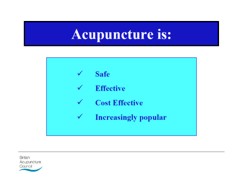
|
In fact there is now a broad consensus about acupuncture.
(1) Real acupuncture and sham acupuncture have been found to be indistinguishable in many trials. This is the case regardless of whether the sham is a retractable needle (or even a toothpick) in the "right" places, or whether it is real needles inserted in the "wrong" places. The latter finding shows clearly that all that stuff about meridians and flow of Qi is sheer hocus pocus. It dates from a pre-scientific age and it was wrong.
(2) A non-blind comparison of acupuncture versus no acupuncture shows an advantage for acupuncture. But the advantage is usually too small to be of any clinical significance. In all probability it is a placebo effect -it’s hard to imagine a more theatrical event than having someone in a white coat stick long needles into you, like a voodoo doll. Sadly, the placebo effect isn’t big enough to be of much use.
Needless to say, none of this is conveyed to the medical students of Southampton. Instead they are shown crude ancient ideas that date from long before anything was known about physiology as though they were actually true. These folks truly live in some alternative universe. Here are some samples from the acupuncture powerpoint show by Susan Woodhead.
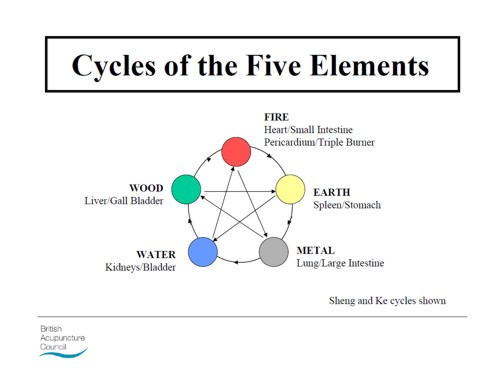
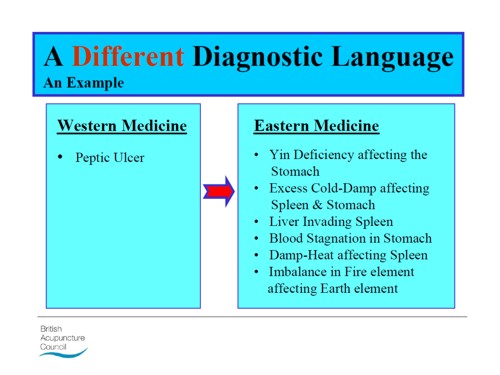
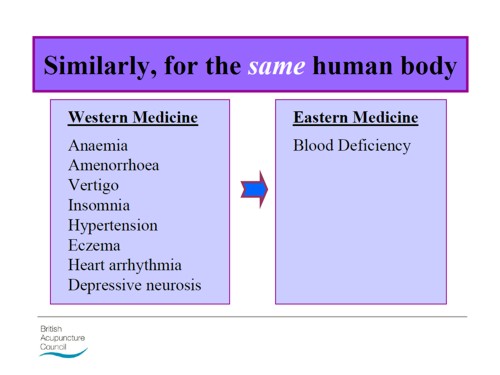
Well this is certainly a "different diagnostic language", but no attempt is made to say which one is right. In the mind of the acupuncurist it seems both are true. It is a characteristic of alternative medicine advocates that they have no difficulty in believing simultaneously several mutually contradictory propositions.
As a final exmple of barminess, just look at the acupuncture points (allegedly) on the ear The fact that it is a favoured by some people in the Pentagon as battlefield acupuncture, is more reminiscent of the mad general, Jack D. Ripper, in Dr Strangelove than it is of science.
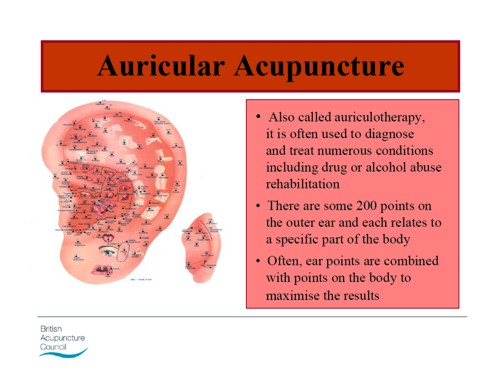
There is an equally uncritical handout on acupuncture by Val Hopwood. It’s dated March 2003, a time before some of the most valuable experiments were done.
The handout says "sham acupuncture
is generally less effective than true acupuncture", precisely the opposite of what’s known now. And there are some bits that give you a good laugh, always helpful in teaching. I like
“There is little doubt that an intact functioning nervous system is required for acupuncture to produce
analgesia or, for that matter, any physiological changes”
and
Modern techniques: These include hybrid techniques such as electro-acupuncture . . . and Ryadoraku [sic] therapy and Vega testing.
Vega testing!! That’s been disproved dozens of times (not least by George Lewith). And actually the other made-up nonsense is spelled Ryodoraku.
It’s true that there is a short paragraph at the end of the handout headed "Scientific evaluation of acupuncture" but it doesn’t cite a single reference and reads more like excuses for why acupuncture so often fails when it’s tested properly.
Homeopathy. Finally a bit about that most boring of topics, the laughable medicine that contains no medicine, homeopathy. Caroline Eyles is a member for the Society of Homeopaths, the organisation that did nothing when its members were caught out in the murderous practice of recommending homeopathy for prevention of malaria. The Society of Homeopaths also endorses Jeremy Sherr, a man so crazy that he believes he can cure AIDS and malaria with sugar pills.
The homeopathy handout given to the students has 367 references, but somehow manages to omit the references to their own boss’s work showing that the pills are placebos. The handout has all the sciencey-sounding words, abused by people who don’t understand them.
"The remedy will be particularly effective if matched to the specific/particular characteristics of the individual (the ‘totality’ of the patient) on all levels, including the emotional and mental levels, as well as just the physical symptoms. ‘Resonance’ with the remedy’s curative power will then be at it’s [sic] best."
The handout is totally misleading about the current state of research. It says
"increasing clinical research confirms it’s [sic] clinical effectiveness in treating patients, including babies and animals (where a placebo effect would be hard to justify)."
|
The powerpont show by Caroline Eyles shows all the insight of a mediaeval vitalist |
|
Anyone who has to rely on the utterly discredited Jacques Benveniste as evidence is clearly clutching at straws. What’s more interesting about this slide the admission that "reproducibility is a problem -oops, an issue" and that RCTs (done largely by homeopaths of course) have "various methodological flaws and poor external validity". You’d think that if that was the best that could be produced after 200 yours, they’d shut up shop and get another job. But, like aging vicars who long since stopped believing in god, but are damned if they’ll give up the nice country rectory, they struggle on, sounding increasingly desperate.
How have topics like this become so embedded in a medical course at a Russell group university?
The details above are a bit tedious and repetitive. It’s already established that hardly any alternative medicine works. Don’t take my word for it. Check the web site of the US National Center for Complementary and Alternative Medicine (NCCAM) who, at a cost of over $2 billion have produced nothing useful.
A rather more interesting question is how a good university like Southampton comes to be exposing its medical students to teaching like this. There must be some powerful allies higher up in the university. In this case it’s pretty obvious who thay are.
Professor Stephen Holgate MD DSc CSc FRCP FRCPath FIBiol FBMS FMed Sci CBE has to be the primary suspect, He’s listed as one of Southampton’s Outstanding Academics. His work is nothing to do with alternative medicine but he’s been a long term supporter of the late unlamented Prince of Wales’ Foundation, and he’s now on the advisory board of it’s successor, the so called "College of Medicine" (for more information about that place see the new “College of Medicine” arising from the ashes of the Prince’s Foundation for Integrated Health, and also Don’t be deceived. The new “College of Medicine” is a fraud and delusion ). His description on that site reads thus.
"Stephen Holgate is MRC Clinical Professor of Immunopharmacology at the University of Southampton School of Medicine and Honorary Consultant Physician at Southampton University Hospital Trust. He is also chair of the MRC’s Populations and Systems Medicine Board. Specialising in respiratory medicine, he is the author of over 800 peer-reviewed papers and contributions to scientific journals and editor of major textbooks on asthma and rhinitis. He is Co-Editor of Clinical and Experimental Allergy, Associate Editor of Clinical Science and on the editorial board of 25 other scientific journals."
Clearly a busy man. Personally I’m deeply suspicious of anyone who claims to be the author of over 800 papers. He graduated in medicine in 1971, so that is an average of over 20 papers a year since then, one every two or three weeks. I’d have trouble reading that many, never mind writing them.
Holgate’s long-standing interest in alternative medicine is baffling. He’s published on the topic with George Lewith, who, incidentally, is one of the directors of the "College of Medicine"..
It may be unkind to mention that, for many years now, I’ve been hearing rumours that Holgate is suffering from an unusually bad case of Knight starvation.
The Division of Medical Education appears to be the other big source of support for. anti-scientific medicine. That is very odd, I know, but it was also the medical education people who were responsible for mis-educating medical students at. St. Bartholomew’s and at Edinburgh university. Southampton’s Division of Medical Education has a mind-boggling 60 academic and support staff. Two of them are of particular interest here.
Faith Hill is director of the division. Her profile doesn’t say anything about alternative medicine, but her interest is clear from a 2003 paper, Complementary and alternative medicine: the next generation of health promotion?. The research consisted of reporting anecdotes from interviews of 52 unnamed people (this sort of thing seems to pass for research in the social sciences). It starts badly by misrepresenting the conclusions of the House of Lords report (2000) on CAM. Although it comes to no useful conclusions, it certainly shows a high tolerance of nonsensical treatments.
Chris Stephens is Associate Dean of Medical Education & Student Experience. His sympathy is shown by a paper he wrote In 2001, with David Owen (the homeopath, above) and George Lewith: Can doctors respond to patients’ increasing interest in complementary and alternative medicine?. Two of the conclusions of this paper were as follows.
"Doctors are training in complementary and alternative medicine and report benefits both for their patients and themselves"
Well, no actually. It wasn’t true then, and it’s probably even less true now. There’s now a lot more evidence and most of it shows alternative medicine doesn’t work.
"Doctors need to address training in and practice of complementary and alternative medicine within their own organisations"
Yes they certainly need to do that.
And the first thing that Drs Hill and Stephens should do is look a bit more closely about what’s taught in their own university, I hope that this post helps them,
Follow-up
4 July 2011. A correspondent has just pointed out that Chris Stephens is a member of the General Chiropractic Council. The GCC is a truly pathetic pseudo-regulator. In the wake of the Simon Singh affair it has been kept busy fending off well-justified complaints against untrue claims made by chiropractors. The GCC is a sad joke, but it’s even sadder to see a Dean of Medical Education at the University of Southampton being involved with an organisation that has treated little matters of truth with such disdain.
A rather unkind tweet from (ex)-chiropractor @RichardLanigan.
“Chris is just another light weight academic who likes being on committees. Regulatory bodies are full of them”

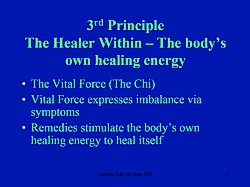
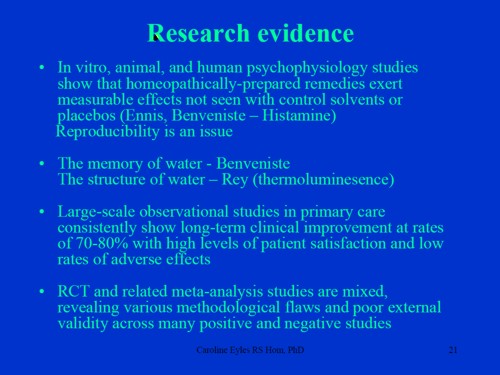

I wonder what the legal position is in relation to organisations like the ‘Natural Practice’ (what a title, eh?) backing Wakefield in that way when he has been found wanting by the GMC.
I wonder what would happen if someone were found, beyond reasonable doubt, to be guilty of a crime, were sent to prison and then some organisation put something on its website saying they were convinced the person was innocent and that everything the person had done was good and right……
But then I forgot, we live in a world where evidence and truth are at the bottom of the pile, whether it is throwing people out of their homes by cutting housing benefit or telling porkies about weapons of mass destruction. Woo rules the world and DC’s notion of the endarkenment becomes more realistic by the day.
[…] Apologists for Andrew Wakefield at Southampton University: a Russell group university teaching some … […]
“These folks truly live in some alternative universe. Here are some samples from the acupuncture powerpoint show by Susan Woodhead.”
Of course, we all know the real origin of these ideas.
http://en.wikipedia.org/wiki/File:Pierre_ciseaux_feuille_lézard_spock_aligned.svg
Rock-paper-scissors-lizard-Spock is part of the ancient and revered culture of Pasadena, California dating back at least far as 2005. Although, like much ancient culture, its true origins are obscure, nonetheless, we should respect it.
My son graduated from the Southampton school of medicine 3 years ago and I heard a bit about the CAM stuff while he was there. It seems to have got a lot worse since then. I strongly recommend that you email the dean of medicine Professor Ian Cameron:
http://www.som.soton.ac.uk/about/staff/listing/profile.asp?itc
david,
from what i gather, part of why you are so upset is how ‘uncritical’ these courses teach alternative medicine. do you expect western medicine to be taught in such a fashion?
there is plenty wrong with western science and medicine and yet we seem to believe in it as if it were a religion, to the point where we dismiss anything that cannot be understood or explained within its limited capabilities.
indeed, science while it has brought a lot of good, has also brought a lot of bad. this probably has to do with the ideology embedded in science that the pursuit of knowledge for its own sake is more important than anything else, even if the cost is suffering to living creatures. why is a positive outcome not enough? if the blackbox produces a good result, why does it have to be opened?
andrew pickering’s book on the history of cybernetics (http://www.amazon.com/Cybernetic-Brain-Sketches-Another-Future/dp/0226667898) provides some really interesting insight here, as he unpacks (by contrasting modern science with second order cybernetics) many of the problems in the way we think and perhaps why you dismiss all this stuff when you shouldn’t.
anyway, i’ve been increasingly using homeopathy, acupuncture and TCM over the past 7 years. first using it as complementary with western medicine, then finding the results of the alternative medicines being much better and with no side effects.
im a well educated and critical thinker, and all i can say is the proof is in the pudding.
@kate raynes-goldie
Thanks for your comment. I’m not sure where to start. Perhaps my post about diet and cancer would help you to understand the importance of causality, It’s at http://www.dcscience.net/?p=1435. There is an excellent popular account by Gary Taubes which is linked in that post too.
I guess you must never have read the classical work of RA Fisher on experimental design and inference. I recommend them
There is one thing that really worries me about your comment and that is your reference to science being “ideological”. That smacks of the log discredited post-modernist attitude (I hope you have read Sokal’s book on that topic). I see from your web page that you have a connection with Ryerson university -though luckily not the department that seems to regard science as “microfascism” -see http://www.dcscience.net/?p=37
@kate raynes-goldie
I see you said on Twitter
I don’t think any doctor would deny that you know best about whether you feel better or not, The problem, both for you and for the doctor, is to know why you got better. If you took some treatment and later you feel better, it is very hard to resist the temptation to say that you got better because of the treatment. In fact you may well have got better even if you hadn’t had the treatment.
This is the heart of the problem in assessing any treatment, and it is why we need RCTs -without them we can never be sure what caused your improvement.
[…] science is everywhere. Whether this is homeopaths claiming to be able to cure cancer, universities teaching alternative medicine alongside rigorous medical and science degrees, celebrities making misleading claims in the public […]
It may be unkind to mention that, for many years now, I’ve been hearing rumours that Holgate is suffering from an unusually bad case of Knight starvation.
A superb piece of detective work and analysis spoilt only by the extract quoted above. I have to say I’m disappointed that a respected blogger, such as yourself, feels the need to broadcast unattributed rumours. I think allowing an intelligent audience to read between the lines is often more effective. I don’t think you needed to make ad hominem attacks to add to the force of hard-hitting article packed with persuasive arguments. And it may provide Holgate with ammunition to counter-argue that your attack, based as it is on rumour, is merely a sign of your anger at perceiving him to be ahead of you in the queue for an honour. Not that I believe you harbour such a desire.
@CrewsControl
I take your point, but it’s clearly labelled as rumour, and I’ve been hearing it from a lot of sources, over many years.
More generally, the honours system in the UK has an invidious effect of making many people toe the line until they are at death’s door, We saw the corrupting effect of the system very clearly during the “cash for honours” scandal. And guess what, they got away with that.
I notice too that two of the people who so signally failed to defend Edzard Ernst (Steve Smith and John Tooke) against pressure from the Prince of Wales now both have knighthoods.
The honours system is archaic and corrupting and it should be abolished.
David – abolute pleasure to meet you yesterday at Phys Soc in Oxford. As I mentioned there is a new BSc in Accupuncture at Manchester Met Uni:
http://www.mmu.ac.uk/study/undergraduate/courses/8753/units/
Unleash the hounds!
@giggsy
Thanks for the tip. I wrote to the VC last night. We’ll see what he says (if he replies at all).
I kept a Freezepage image http://www.freezepage.com/1310683073OQFXLVNDRW
Goodness, that MMU course outline Giogsy linked to (which is new, BTW – wasn’t there when I looked at their site a few months ago) is a shocker. Lay on the Chinese mumbo-jumbo.
As I remember it from my previous hunt through their pages, this course is the brainchild of some of the MMU physiotherapists. So I guess they will be teaching the mainstream ‘Health & Disease’ units, as well as the mumbo jumbo. How very Doublethink.
BTW, did you spot that the course description mentions a year 2 core unit on “Role of Exercise in Channel Disorders”? Somehow I don’t think that is ION channels, though I am rather at a loss as to what it does mean.
@Dr Aust
An earlier year 2 module “Clinical skills 2” suggests the involvement of Yin channels. I guess the “in” should be subscripted and that these channels allow the movement of yttrium ions into cells. Disorders of these channels might be of importance to someone spending too much time sitting in front of the TV, hence the potential role of exercise.
@AllyM
Hah. I like it. If only…
Of course, what they are calling channels is another version of the dreaded meridians.
PS Yttrium is likely a better channel blocker than a permeant ion.
I don’t doubt that many contributors to DC’s blog have little enthusiasm for Western Medical Acupuncture (WMA), but at least it attempts to base its efficacy on scientific grounds (however weak the supposed biological effects may be compared to placebo). The British Medical Acupuncture Society champions WMA and tends on the whole to steer clear of TCM.
Not so the physiotherapy profession which sees no conflict in enthusiastically fusing together Oriental and western acupuncture, both in clinical practice and in university courses.
Its common knowledge that most physiotherapy treatments lack evidence, but they at least are based on scientific theory. WMA has been added to the physiotherapy armoury, given it supposed neuro-hormonal pain relieving effects.
Sadly though, TCM also has a strong foothold in physiotherapy, seemingly not limited to acupuncture but now extended to exercise programmes. This has come about as a result of enthusiastic TCM trained physiotherapists strongly promoting Oriental practice seemingly without anyone in the profession questioning this approach.
It is the lack of scientific scrutiny within the physiotherapy profession that has allowed this confused doublethink situation to arise.
Do you have any links/references for us to look at Dudeistan?
It would certainly be surprising and alarming news to me.
http://www.aacp.org.uk/
@Dudeistan
Oh my, that’s a scary site. It says thst “The The Acupuncture Association of Chartered Physiotherapists [AACP] is a Clinical Interest Group [CIG] of the Chartered Society of Physiotherapy [CSP]. ”
Notice the favourite “bait and switch” word, “integrated”.
It goes for all the nonsense too.
Oh yes?
Interestingly the claims for efficacy are pretty modest. If that’s all they believe it can do, why bother?
And interesting that searching the site for the word ‘evidence’ produces nothing whatsoever that’s visible to non-members.
It’s really scary that such a respectable job should have hundreds of people who are willing to ignore evidence and spout nonsense.
Hi Professor Colquhoun,
You wrote on 19 July @ Dudeistan re physiotherapy: “It’s really scary that such a respectable job should have hundreds of people who are willing to ignore evidence and spout nonsense.”
It’s worse than that.
Read this in Frontline Magazine on the website of the Chartered Society of Physiotherapy
“A Credit to Physiotherapy:
CSP Congress 2005 saw 12 physiotherapists honoured for their outstanding contributions to the profession…..
……..John Cross received a fellowship for his pioneering services to physiotherapy in exploring the contribution that the theory and practice of complementary medicine can make to physiotherapy practice.
Following extensive training and research, John achieved a doctorate in acupuncture, being the first physiotherapist to receive such an award. He has incorporated the principles of traditional Chinese medicine into physiotherapy and developed a particular and valuable system of acupressure, widely used within the profession.
Through lectures, workshops, courses, seminars, articles and books John has demonstrated that orthodox theory and practice can be enriched through the insights offered by mind-body medicine.
The clinical effectiveness of his approach is demonstrated by case histories and subjective self-reporting and this level of effectiveness is experienced by practitioners who have attended his many courses.
He has held a number of posts both within and outside the profession at branch and clinical interest level, being actively involved with a large number of these groups.
Outside the profession he is involved with national acupuncture and craniosacral organisations as well as being an accredited Methodist local preacher….”.
http://www.csp.org.uk/frontline/article/credit-physiotherapy.
The Chartered Society of Physiotherapists, the physios’ trade union, promotes acupuncture, also the practice of reflexology and craniosacral therapy as physiotherapy modalities. A patient referred for traditional physiotherapy for a medical problem by a medical doctor in the private sector doesn’t know what rubbish he is going to be treated with, nor does the doctor, as physiotherapists won a political battle in the 1970s for “autonomy”, ie to be freed from governaance by the medical profession.
@socratella
Thanks for supplying all that information.
It’s true, I suppose, that physiotherapy has not traditionally been a subject where evidence has been highly valued. When it comes to a physiotherapist showing you how to walk downstairs on crutches there is not much need for evidence, but in other areas it would be really nice to know how much of it is effective. Even when ineffective it had been largely free of nonsensical mumbo jumbo, at least until the acupuncturists managed to muscle in.
One sentence in what you quote is particularly telling.
“The clinical effectiveness of his approach is demonstrated by case histories and subjective self-reporting”
With people like that in charge of physiotherapy, it will stay in the scientific dark ages.
Physiotherapy is a useful service. Teaching someone how to walk down a flight of stairs following surgery or trauma is an important skill as it can make all the difference whether a patient will gain independence or not (particularly the elderly). Likewise, teaching an acute stroke patient how to maximise motor and sensory function through physical retraining will determine that patient’s future quality of life. These practices are hard to measure and thus evidence is difficult to obtain (but perhaps not impossible).
However, where reflexology and cranio-sacral therapy fits into modern physiotherapy practice is a complete mystery to me. As I mentioned in a previous post, westernised acupuncture has made it into the physiotherapists’ toolbox by the skin of its teeth due to tenuous scientific laboratory research. In contrast, TCM, cranio-sacral therapy and reflexology are really acts of faith and I cannot understand how a scientific profession can entertain such practices.
Perhaps the problem lies at the under-graduate level where not enough time goes into teaching basic scientific enquiry. However, going back to pre 1970’s physiotherapy when all treatments were prescribed by a doctor (the physiotherapist carrying them out as a technician), would only make matters worse. It would stifle those in the profession who do not practice altmed but who would be forced to carry out inappropriate treatments prescribed by doctors who know little about physical rehab.
@ dudeistan
You say “TCM, cranio-sacral therapy and reflexology are really acts of faith and I cannot understand how a scientific profession can entertain such practices.”
You might also ask “And where is the regulator, the HPC, in all this?” the Glossary of the February 2011 Command Paper defines: “profession – A recognisable group of people in an occupation requiring a distinct qualification and applying a defined body of knowledge.” I can’t work out what the “defined body of knowledge” of physiotherapy is, beyond the biomedical science of the basic physiotherapy curriculum for registration with the HPC. If the “defined body of knowledge” is biomedical science, then where do acupuncture, reflexology, craniosacral therapy etc. fit in? It’s also not clear who is responsible for defining the “body of knowledge” – the regulator or the Chartered Society of Physiotherapists (CSP). As there is no requirement for a physiotherapist to be a member of the CSP, it seems that the regulator, the HPC, is content for the individual registrant to decide for himself what constitutes the “defined body of knowledge” of physiotherapy that he is applying. In doing so, it seems to me that the HPC is in breach of the statutory instrument under which it operates, the Health Professions Order 2001.
As a Southampton graduate I would recommend all fellow alumni to contact the university and protest this idiocy.
[…] sc_project=233721; sc_invisible=0; sc_partition=0; sc_security=""; ← Apologists for Andrew Wakefield at Southampton University: a Russell group university teaching some … […]
[…] post-1992 universities, the subject has crept into more prestigious universities. Of these, the University of Southampton is perhaps the worst, because of the presence of George Lewith, and his defender, Stephen Holgate. […]